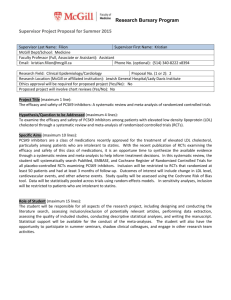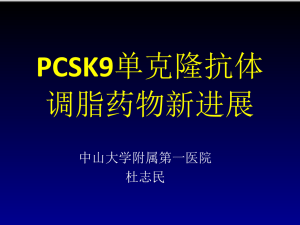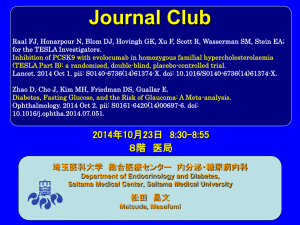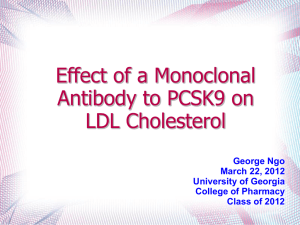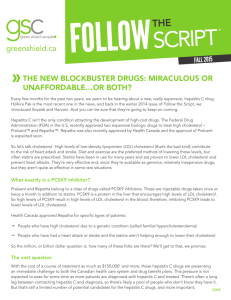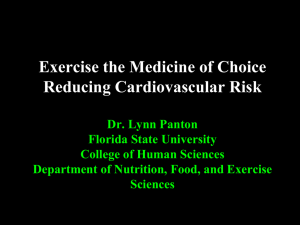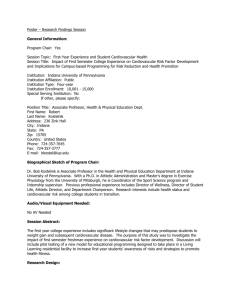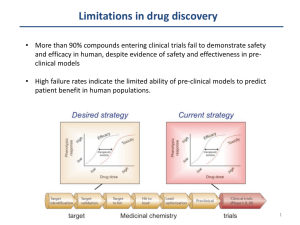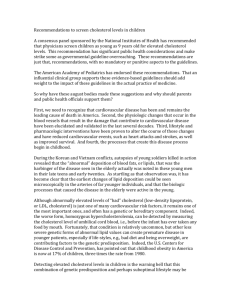DOCX ENG
advertisement
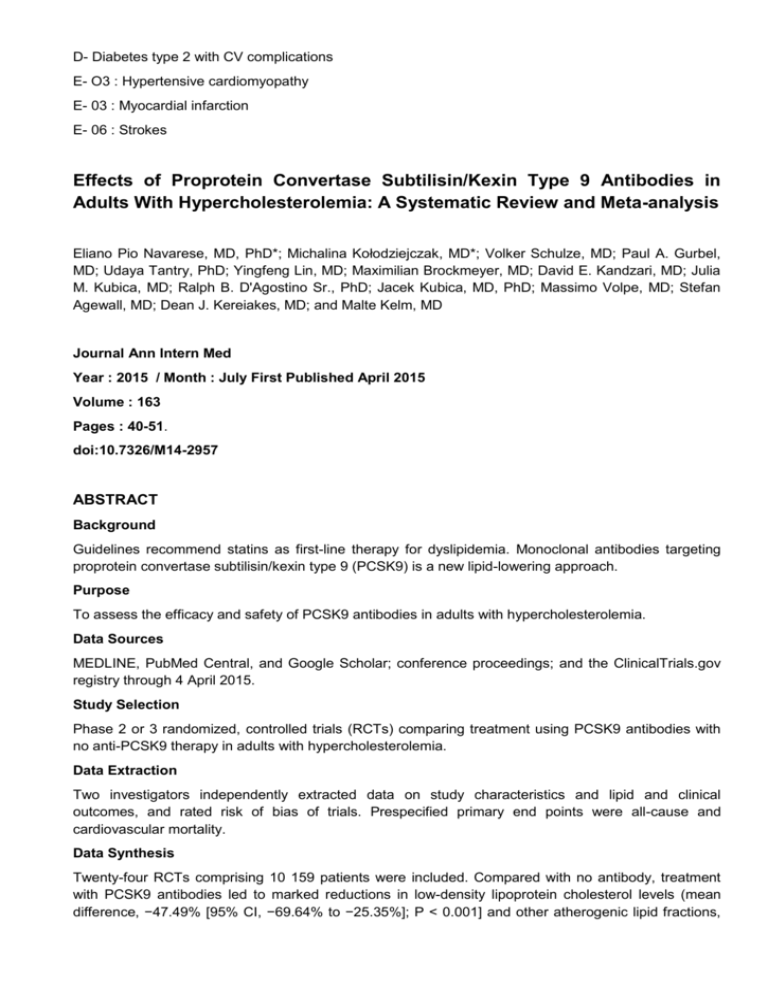
D- Diabetes type 2 with CV complications E- O3 : Hypertensive cardiomyopathy E- 03 : Myocardial infarction E- 06 : Strokes Effects of Proprotein Convertase Subtilisin/Kexin Type 9 Antibodies in Adults With Hypercholesterolemia: A Systematic Review and Meta-analysis Eliano Pio Navarese, MD, PhD*; Michalina Kołodziejczak, MD*; Volker Schulze, MD; Paul A. Gurbel, MD; Udaya Tantry, PhD; Yingfeng Lin, MD; Maximilian Brockmeyer, MD; David E. Kandzari, MD; Julia M. Kubica, MD; Ralph B. D'Agostino Sr., PhD; Jacek Kubica, MD, PhD; Massimo Volpe, MD; Stefan Agewall, MD; Dean J. Kereiakes, MD; and Malte Kelm, MD Journal Ann Intern Med Year : 2015 / Month : July First Published April 2015 Volume : 163 Pages : 40-51. doi:10.7326/M14-2957 ABSTRACT Background Guidelines recommend statins as first-line therapy for dyslipidemia. Monoclonal antibodies targeting proprotein convertase subtilisin/kexin type 9 (PCSK9) is a new lipid-lowering approach. Purpose To assess the efficacy and safety of PCSK9 antibodies in adults with hypercholesterolemia. Data Sources MEDLINE, PubMed Central, and Google Scholar; conference proceedings; and the ClinicalTrials.gov registry through 4 April 2015. Study Selection Phase 2 or 3 randomized, controlled trials (RCTs) comparing treatment using PCSK9 antibodies with no anti-PCSK9 therapy in adults with hypercholesterolemia. Data Extraction Two investigators independently extracted data on study characteristics and lipid and clinical outcomes, and rated risk of bias of trials. Prespecified primary end points were all-cause and cardiovascular mortality. Data Synthesis Twenty-four RCTs comprising 10 159 patients were included. Compared with no antibody, treatment with PCSK9 antibodies led to marked reductions in low-density lipoprotein cholesterol levels (mean difference, −47.49% [95% CI, −69.64% to −25.35%]; P < 0.001] and other atherogenic lipid fractions, and it reduced all-cause mortality (odds ratio [OR], 0.45 [CI, 0.23 to 0.86]; P = 0.015; heterogeneity P = 0.63; I2 = 0%) and cardiovascular mortality (OR, 0.50 [CI, 0.23 to 1.10]; P = 0.084; heterogeneity P = 0.78; I2 = 0%). The rate of myocardial infarction was significantly reduced with use of PCSK9 antibodies (OR, 0.49 [CI, 0.26 to 0.93]; P = 0.030; heterogeneity P = 0.45; I2 = 0%), and increases in the serum creatine kinase level were reduced (OR, 0.72 [CI, 0.54 to 0.96]; P = 0.026; heterogeneity P = 0.65; I2 = 0%). Serious adverse events did not increase with administration of PCSK9 antibodies. Limitation Results were derived from study-level data rather than patient-level data, and clinical outcome data are rare. Conclusion PCSK9 antibodies seem to be safe and effective for adults with dyslipidemia. COMMENTS Hypercholesterolemia contributes substantially to the development of coronary artery disease and the risk for cardiovascular events. Current guidelines recommend lipid-lowering for patients with known cardiovascular disease. Statins are first-line pharmacotherapy, having shown significant reductions in both LDL cholesterol values and cardiovascular events. Yet, despite intensive statin regimens to delay atherosclerotic plaque development and lower the risk for cardiovascular complications a sizable proportion of statintreated patients does not achieve recommended target LDL cholesterol levels. Proprotein convertase subtilisin/kexin type 9 (PCSK9) is an enzyme that plays an important role in lipid metabolism by modulating the density of LDL cholesterol receptors in multiple organs. Iinhibition of PCSK9 prevents LDL receptor degradation within lysosomes and preserves receptor recycling to the hepatocyte surface. Monoclonal antibody binding and inhibition of PCSK9 prevents PCSK9 binding to the LDL cholesterol–LDL receptor complex and subsequent lysosomal degradation of the LDL receptor. The LDL-receptor recycling is preserved, with a consequent increase in receptor density on the hepatocyte surface and LDL cholesterol clearance. The PCSK9 inhibitors are currently undergoing regulatory review on the basis of efficacy and safety data from LDL cholesterol–lowering trials. The effects of PCSK9 antibodies in 10 159 adults with hypercholesterolemia were analyzed in this study. Most trials involved patients treated with statins who had not met target LDL cholesterol goals, although some focused only on patients who did not tolerate statins. Summary trial data showed that, compared with placebo or ezetimibe control groups, PCSK9 inhibition led to a 47% reduction in LDL cholesterol and a 26% reduction in lipoprotein(a) levels. Data also showed reductions in all-cause mortality rates, cardiovascular mortality rates, and myocardial infarctions, all of which were statistically significant except the cardiovascular mortality outcome (P = 0.084). The main findings are that compared with no anti-PCSK9 treatment, use of PCSK9 antibodies is associated with. 1) lower odds of all-cause mortality and myocardial infarction and a statistically nonsignificant reduction in cardiovascular mortality; 2) lower increase in the serum creatine kinase level; 3) no increase in serious adverse events; and 4) a marked reduction in atherogenic lipid fractions. Improvements in clinical outcomes were consistent in multiple sensitivity analyses that used different methods of analysis. Confirmation of these findings in long-term, ongoing, pivotal trials with prespecified primary CVD end points and monitoring of a broad range of adverse events will help establish the role of these novel agents in CVD risk management. Pr. Jacques CHANARD Professor of Nephrology
